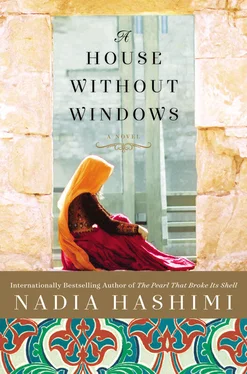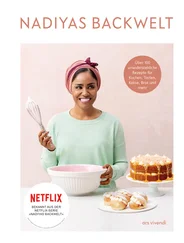Gulnaz lifted the ends of her black-and-green head scarf, crossed them in front of her, and let them drape over her shoulders in one fluid motion.
“I need you to do something for me,” she said as the sound of a diesel engine rumbled past the prison. “I need you to tell the qazi that Safatullah’s daughter wishes to see him.”
“I see. May I ask, who is Safatullah?”
“My father.”
“I’m sorry I don’t recognize your father’s name. Should I?”
“No,” Gulnaz said without elaborating.
Yusuf’s eyebrows lifted slightly.
“Do you know this judge?”
“I have no business knowing judges here,” Gulnaz replied flatly.
“No, I suppose you wouldn’t.”
They weighed each other’s words for a moment.
“I’ll speak to the qazi, ” Yusuf offered. “But how about you and I sit down and speak for a moment? Maybe we could go inside and find a place to talk.”
“I prefer not to be in a prison. We can speak here.” Gulnaz took a few steps away from the building. Yusuf had no choice but to follow. “What is it you want to speak about?”
“In order to defend Zeba, I’ve got to understand her. I need to know what kind of person she is. I need to know what kind of mother she is. I need to know about her relationship with her husband.”
Gulnaz had never been one to speak of private matters. The daughter of the murshid had been raised in a world of discretion. People could not know how the murshid knew the things he seemed to know. They could not find out that the family compound was a network of observers, scouts, runners, and messengers. Safatullah was the murshid, but without his family, he would have been deaf and blind and impotent.
Discretion served Gulnaz well later in her life, too. People asked lots of uncomfortable questions when Gulnaz’s husband disappeared.
She didn’t tell anyone, not even their children, that she’d watched him fill a flask with tea and tuck a rusted gun into the coiled hat on his head. In a small bag, he’d packed one of Gulnaz’s old housedresses and a few sets of clothing. He’d kissed his wife on the cheek and told her the entire world had turned into a battlefield.
The determination on his face told Gulnaz it would not be useful to argue.
He went off to end the war, she maintained over the years, wondering if maybe that weren’t some form of the truth.
“MY DAUGHTER DOES NOT SPEAK TO ME ABOUT HER HUSBAND. She never has.” Why should she? Zeba had matched her mother’s reticence in the last few years. It was a punishment.
“Tell me what she was like when she was younger,” Yusuf suggested. There had to be some kind of useful information she could offer.
Gulnaz looked back toward the prison, squinting in the midday sun. Zeba as a girl. Nothing brought Gulnaz as much joy as thinking about her daughter as a child. Before she could stop herself, she was reminiscing.
“Zeba twinkled like a star. She laughed often and followed her brother around everywhere he went. I kept her close at my side and taught her everything I could about managing a household. We were a pious home and Zeba grew up saying her prayers, honoring her family. She was a good girl, always obedient.”
“What was her relationship like with her father?” Yusuf asked gently.
“She was in his arms from the moment she was born. He would pick her up and toss her into the air. They were very close up until he was gone.”
“Gone?”
“He went off to fight the Russians,” Gulnaz continued with rehearsed ease. “He never came back.”
Yusuf sighed empathetically.
“A brave man. You’ve not heard from him since then?”
“Not a word, not a letter.”
“How did Zeba react to his absence? It must have been hard on her.”
“It was hard on all of us. That was not a time that passed easily.” Gulnaz turned her gaze back to Yusuf. “She was only six years old then. She cried. She asked for him often. But people move on and Zeba did too. He was not a warrior. I knew she would never see him again. My husband’s family, they wanted to hold on to hope. They wanted to believe he would walk through the front door at any moment and tell grand stories of war.”
“You didn’t think there was even a chance he would return?”
“If he could have returned, he would have. But he didn’t, which is how I knew he was dead.”
“I see. Of course.”
He couldn’t possibly see, Gulnaz thought. Every family was a mystery to outsiders. There was no way to understand a father and his children or a husband and wife by sitting with them and asking a few questions.
“Tell me about her marriage.”
“It was meant to be a happy marriage.”
“Aren’t they all,” Yusuf said, chuckling, though Gulnaz thought it an odd thing for someone so young to say.
“Kamal’s grandfather was an army general, a very respected man. He was good friends with my father. They sat together one day and, over a cup of tea, decided that Zeba and Kamal should be husband and wife. They tied themselves to each other through their grandchildren.”
“Did you approve of the match?”
“No one bothered to ask me.”
“Did you object?”
Gulnaz shot him an impatient look.
“It was much bigger than me.”
Yusuf thought of his sister. His parents had always imagined her marrying the son of their good friend, but she’d foiled their plans by falling in love with their neighbor. He was young when she was married, but he remembered the shouting, his sister slamming her door so hard it rattled the walls of their apartment. Would Yusuf have stood up for his sister if they’d insisted she follow their wishes or would her problems have been bigger than him, too?
“How did Zeba feel about the marriage? She must have been young.”
“She was seventeen and ready to live her life. She was less of a child than others her age. . probably because she’d lost her father.”
“So she was content.”
“As content as any new bride can be.” Gulnaz drifted briefly to the first weeks of her own marriage to Zeba’s father. Her new husband had showered her with gifts and gazed at her in such a way that, even in the privacy of their home, she used her head scarf to cover the flush in her cheeks. Gulnaz had begun to warm to him when the comments began. Her husband had gushed about her so often with his family that, drop by drop, he’d created a river of jealousy toward her.
“We thought Kamal was a decent man. Zeba did not complain to me, but I did not see her much. When they were first married, she lived with his family. I did not want to interfere, and Kamal kept to himself. He didn’t want anything to do with his wife’s family. He and my son, Rafi, never had much of anything to say to each other.”
“But Zeba and Kamal moved away from his family at some point. When did that happen?”
“They moved after the second child was born. Little Girl, at least that’s what they called her at the time.”
“Was there a reason they moved?”
Gulnaz shook her head.
“If there was, I don’t know it. No one knew anything about him. He couldn’t be trusted — that was all I knew.”
“What makes you say that?”
“One time Kamal brought Zeba and the children over on their way to visit one of his cousins. I’d made mushroom stew, a recipe I learned from my own mother, God rest her soul. I’d also made rice and meatballs. Rafi’s wife, Shokria, had just given birth and was in her resting period. She needed to eat well so I’d been cooking fresh food all day. Kamal sat back and didn’t touch a bite of it. He sniffed at the spread and turned up his nose. Everyone else was starving, especially the children. We begged him to try at least a little, that it wouldn’t feel right for us to eat if he didn’t join us. It was the rudest thing I’ve ever seen.”
Читать дальше











